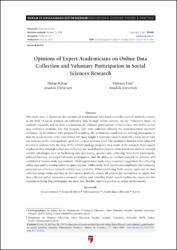| dc.contributor.author | Kılınç, Hakan | |
| dc.contributor.author | Fırat, Mehmet | |
| dc.date.accessioned | 2019-10-22T20:07:28Z | |
| dc.date.available | 2019-10-22T20:07:28Z | |
| dc.date.issued | 2017 | |
| dc.identifier.issn | 1303-0485 | |
| dc.identifier.issn | 2148-7561 | |
| dc.identifier.uri | https://dx.doi.org/10.12738/estp.2017.5.0261 | |
| dc.identifier.uri | https://hdl.handle.net/11421/22334 | |
| dc.description | WOS: 000417396600001 | en_US |
| dc.description.abstract | This study aims to determine the opinions of academicians who teach scientific research methods courses in the field of social sciences on collecting data through online surveys, on the "voluntary basis" of academic research, and on their comparisons of voluntary participation in face-to-face and online-survey data collection methods. For this purpose, data were collected utilizing the semi-structured interview technique. In accordance with purposeful sampling, the preliminary condition for seeking participants is that the academicians to be interviewed will have taught a scientific research methods course for at least one semester at the undergraduate, graduate, or post-graduate level. The qualitative data has been subjected to content analysis with the help of the NVIVO package program. As a result of the research, field experts emphasize that although online data collection has such disadvantages as a low return rate and low external validity, advantages such as facilitating data processing, quicker data collecting from more participants, reduced data loss, increased voluntary participation, and the ability to conduct research on sensitive and confidential matters make it prominent. Field experts have made some important suggestions for collecting online data and increasing voluntary participation. Additionally, field experts also emphasize that voluntary participation enhances research validity and reliability. When examining field experts' opinions on data collected using online and face-to-face survey methods, almost all experts are determined to report that data collected online increases a research's validity and reliability. Field experts explain the reason for this situation as being that participants are more free, flexible, and independent in online environments. | en_US |
| dc.language.iso | eng | en_US |
| dc.publisher | EDAM | en_US |
| dc.relation.isversionof | 10.12738/estp.2017.5.0261 | en_US |
| dc.rights | info:eu-repo/semantics/openAccess | en_US |
| dc.subject | Social Sciences | en_US |
| dc.subject | Research Ethics | en_US |
| dc.subject | Voluntariness | en_US |
| dc.subject | Online Data Collection | en_US |
| dc.subject | Survey | en_US |
| dc.title | Opinions of Expert Academicians on Online Data Collection and Voluntary Participation in Social Sciences Research | en_US |
| dc.type | article | en_US |
| dc.relation.journal | Educational Sciences-Theory & Practice | en_US |
| dc.contributor.department | Anadolu Üniversitesi, Sosyal Bilimler Enstitüsü, Uzaktan Eğitim Anabilim Dalı | en_US |
| dc.identifier.volume | 17 | en_US |
| dc.identifier.issue | 5 | en_US |
| dc.identifier.startpage | 1461 | en_US |
| dc.identifier.endpage | 1486 | en_US |
| dc.relation.publicationcategory | Makale - Uluslararası Hakemli Dergi - Kurum Öğretim Elemanı | en_US] |
| dc.contributor.institutionauthor | Fırat, Mehmet | |


















